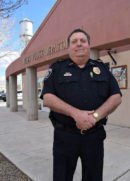Local law enforcement officials are sounding off about what some call a “terrible” bill circulating its way through the state Legislature.
If signed into law, Senate Bill 227, introduced by Sen. Linda Lopez (D-Bernalillo), would establish a standard use-of-force policy for law enforcement agencies across New Mexico.
SB 227 would prohibit police officers and deputies from using physical force until they’ve exhausted de-escalation tactics and techniques and, even then, force must be proportionate to the situation.
It also forbids law enforcement from using deadly force against someone who is a threat only to themselves, restricts the ability to shoot at moving vehicles and bans the use of chokeholds, tear gas, rubber bullets and “shall not direct a dog to bite a person.”
The bill sets standards for reporting officer interactions that result in injury or death, and sets guidelines for executing search warrants, including a mandated 45-second waiting period between knocking on a door and entering by force.
“A law enforcement officer entering a premises pursuant to a search warrant shall not be armed with specialized, military-style equipment, including assault rifles, submachine guns, shotguns, flash bang stun grenades or other stun agents, except when expressly authorized by the search warrant upon a showing of particularized suspicion that an occupant of the target premises is in actual possession of deadly weaponry and the use of specialized weaponry by law enforcement officers is likely to be necessary.”
Valencia County Sheriff Denise Vigil says Lopez doesn’t understand what it takes to do the job of law enforcement, and hopes this piece of legislation fails.

Denise Vigil
Valencia County Sheriff
“I feel they’re disarming law enforcement in so many ways, that is ultimately dangerous for us,” Vigil said. “I feel really bad for law enforcement right now. Yes, there is a need for change and reform — we’ve all said that — but in the manner that they’re doing it is really not friendly to us at all.”
Los Lunas Police Chief Naithan Gurule agrees with Vigil, saying this bill shows how Sen. Lopez and other legislators are “too out of touch with law enforcement.”
Belen Police Chief James Harris is on the same page as his counterparts, saying Senate Bill 221 is “devastating” to law enforcement, and lawmakers are “Giving into the fever of the country … 99.8 percent of cops are out there doing the job and doing it properly.”
By decreasing the amount of tools law enforcement is able to use, Vigil says, would be detrimental to her deputies and law enforcement around the state. She said her deputies have had first-hand experience with people who have barricaded themselves in a house, and have had to use certain law enforcement tactics and tools to draw the person out.
“In these cases, we’ve done everything possible, using de-escalation and talking people out, using robots and other methods,” Vigil said. “In one instance, after eight hours, we used gas. It was the only way to defuse the situation to go in and place him in custody safely.”
None of the law enforcement agencies in Valencia County use chokeholds as a standard operating procedure, but the sheriff did say there are reasons for engaging suspects when they pose a danger.
The bill also restricts the use of “less lethal” tools, such as bean bags and tear gas, which, Vigil says, is used when other methods aren’t available, such as bringing in a professional who might be able to talk a suspect down.
“Where is that funding going to come from for that professional?” she asked. “It’s kind of the cart-before-horse situation. Is there going to be a team assigned to us? We don’t know.”
The Valencia County Sheriff’s Office does have a deputy, Victor Chavez, assigned to de-escalation processes and hostage negotiation situations. However, the one deputy can’t be at every situation.
“It’s difficult to say we can’t use these tools when they’re trying to prevent us from using lethal force,” the sheriff said. “How do we ultimately get that person out of the home, and who is going to provide that specialized counselor and where is that funding coming from?”
Harris agrees, saying situations change quickly and law enforcement sometimes doesn’t have time to call in a counselor before a suspect becomes violent.
“If this was a perfect world and we had all the time to study each and every incident, then great, but it’s not a perfect world,” Harris said. “This profession is dangerous, and we do what we have to do to survive and to minimize injury to ourselves, the public and the suspects.”
Gurule says the author of the bill doesn’t provide for training or funding to operate under these specific requirements.

Naithan Gurule
Los Lunas Police Chief
“They have a bigger responsibility than just drafting a bill without law enforcement input,” he said. “I think when you do this, you have to explain how you’re going to provide training to departments. Most of this stuff doesn’t make sense.”
While the sheriff understands the proposed restriction regarding shooting at a moving vehicle, there are certain situations where it might be necessary.
“Would we intervene to prohibit someone from killing another person? Absolutely,” Vigil said. “I feel that if we don’t try to stop a person in a motor vehicle, which is a deadly weapon that can be used against us or a civilian, and if we don’t stop them, what good are we?”
Gurule said law enforcement does currently have a standard definition of use of force, but the problem, he says, is departments use varying definitions, ranging from force that is anything more than un-resisted handcuffing to believing forced was used only if an injury occurred.
“The bill is terrible,” Gurule said. “It does nothing for police reform.”
Gurule pointed to a case his officers encountered a couple of weeks ago when a felon, who was a repeat offender with a felony warrant for a weapons charge. Federal marshals had been tracking him and found him at a house in Rio Communities.
“We showed up to help,” the chief said. “If we weren’t allowed to use our chemical munitions to deal with this subject, our choices were to try to call him out, which we do anyway, or go in, which is dangerous for the police officers and for the suspect.”
Gurule said his officers used gas to push the suspect out of the home. If they aren’t allowed to use these types of tools, the chief said, their jobs become that much harder and lives could be at risk.
Vigil says the bill has multiple issues that tie law enforcement’s hands, including the 45-second waiting period between knocking on a door and entering by force when executing a search warrant. She says it will put officers in danger.
All three said their departments have never executed or even asked for a no-knock warrant, even when they’ve had information on suspects who were extremely dangerous.
Harris explained waiting 45 seconds between knocking and introducing themselves to when they can enter could be dangerous. He says suspects could have time to arm themselves, take a hostage, flush drugs and even formulate a plan that could be dangerous to themselves and law enforcement.

James Harris
Belen Police Chief
“The only time we are actually allowed to use a no-knock warrant, which I have never seen one executed, is done in extreme situations where there is surveillance being done and we’re in severe danger,” Harris said. “And it has to be authorized by a judge. All search warrants have to have probable cause.”
Harris said officers lives will be placed in danger if they have to wait the 45 seconds before they enter.
“It also puts the bad guys in danger as well, because in 45 seconds we’re going to be assuming people are going to be arming themselves,” he said. “That’s going to place a heightened response on officers.”
Vigil is also concerned about the portion in the bill where law enforcement can’t use military-type of weapons during the execution of the search warrant.
“Our SWAT team uses AR-15s, and most of the time they are the ones who make entry first for the purpose of dealing with dangerous persons,” Vigil said.
Gurule, who is a member of the New Mexico Law Enforcement Academy Board, says police reform is important, but when all the tools are taken away in regards to the de-escalation process, it’s nearly impossible for law enforcement to do their jobs properly.
“You’re either left with using your hands to take someone into custody, which is also dangerous for both parties, or the only other option is your gun,” the Los Lunas chief said. “And that’s after you try and talk to the person, which all officers do.”
Gurule says the bigger issue in making a difference in law enforcement across the state is standardizing processes including use of force, a citizen complaint system and body-worn cameras. He also says an Early Intervention Personnel System designed to proactively and systematically review certain employee work behaviors for possible indicators of performance or stress related problems, can assist employees who may benefit from departmental intervention.
Clara Garcia is the editor and publisher of the Valencia County News-Bulletin.
She is a native of the city of Belen, beginning her journalism career at the News-Bulletin in 1998 as the crime and courts reporter. During her time at the paper, Clara has won numerous awards for her writing, photography and typography and design both from the National Newspaper Association and the New Mexico Press Association.
















